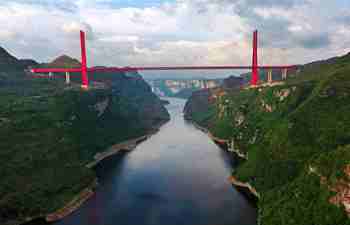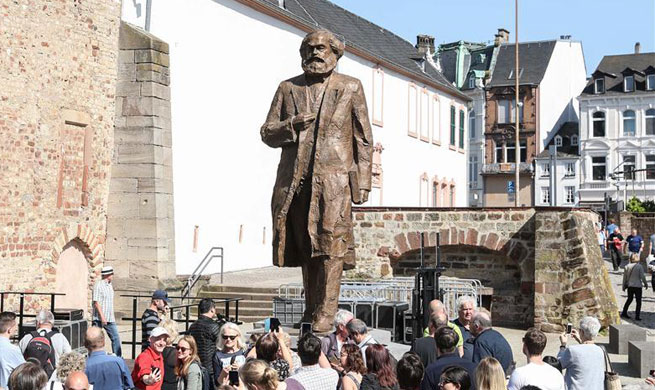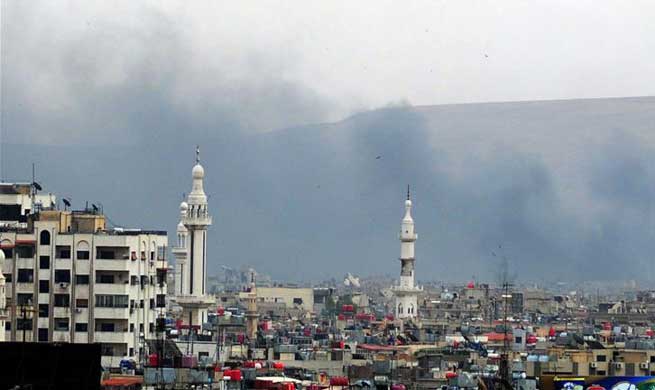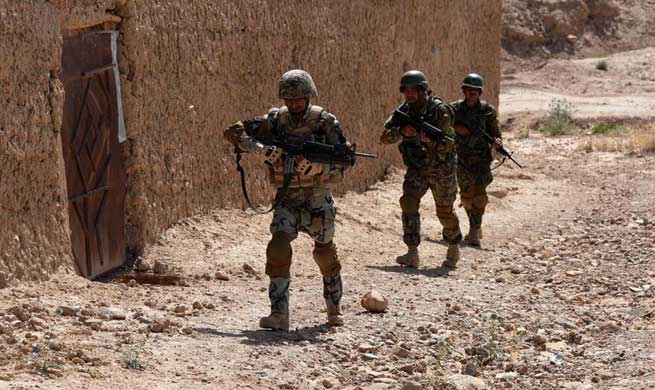by Keren Setton
JERUSALEM, May 6 (Xinhua) -- Israeli Prime Minister Benjamin Netanyahu slammed Sunday the Iranian nuclear deal (JCPOA) "horrible," before U.S. President Donald Trump's possible withdrawal from the deal.
Netanyahu said the deal allows the continuation of uranium enrichment and "Iranian enrichment" referring to the lifting of crippling economic sanctions on the country.
Netanyahu has been a sharp critic of the deal since the days it was being negotiated by Iran and six powers as Russia, China, the United States, Britain, France and Germany.
When the deal was signed in 2015 during the administration of former U.S. President Barack Obama, the Israeli leader faced opposition to his stance at the White House.
Since Trump took office last year, Netanyahu has earned an ally in Washington. But Trump and Netanyahu find themselves largely alone in an international arena that is largely favorable of the nuclear agreement.
Israeli officials have said the nuclear deal does not prevent Iran from acquiring nuclear weapons.
They have been critical of what they call "a weak inspection regime" in place and the fact that the deal does not address Iran's ballistic missile abilities which it has continued to develop.
Last week, the Israeli prime minister revealed tens of thousands of documents seized by covert intelligence operatives in Tehran, and the documents are called by Israel as the "Iranian nuclear archive," which could be viewed as an attempt to sway international opinion.
The latest documents date back to 2005, ten years before the agreement was signed, which raised questions as to its current relevance.
The European Union (EU) Foreign Policy Chief Federica Mogherini said in an immediate response that they did not "put into question Iran's compliance with the JCPOA commitments, meaning post 2015 nuclear commitments."
But according to defense officials in Israel, the intelligence achievement was a significant one not to be underestimated.
"It gives us most of the pieces of the puzzle," said a senior intelligence officer speaking on condition of anonymity. "The Iranian nuclear program is more comprehensive and robust than we assessed before."
According to the intelligence official, the information seized in a daring operation on Iranian soil "takes us all the way to today."
"The nuclear facilities still exist, so does the organization," he added.
In his presentation last week, Netanyahu said high-ranking Iranian officials that were leading figures of Iran's overt nuclear program prior to the deal, had been transferred to different positions but still undertaking the same task -- promoting Iran's nuclear aspirations.
Tens of thousands of documents were reportedly seized in the beginning of this year.
"The issue is not whether they are new or not, because they are relevant. Iran is actively trying to keep its nuclear program," the intelligence official said.
According to a senior Israeli official speaking on condition of anonymity, the documents are a "blueprint for the coming few years."
"If this is all they have, then they are pretty advanced and not many years away from a nuclear arsenal," he added.
Just before speaking to journalists, Netanyahu told members of his cabinet that Israel is "determined to block Iran's aggression against us even if this means a struggle. Better now than later."
The comment came after weeks of rising tensions between the two countries.
Israel is believed to be behind several airstrikes carried out in Syria in recent months against Iranian targets in the country. Iran has sent thousands of fighters to help Syrian President Bashar al-Assad survive a seven-year civil war in Syria that has weakened his regime.
Iran, which is thousands of kilometers away from Israel, could improve its offensive positions against Israel by increasing its presence in Syria, which shares a border with the Jewish state.
Israeli defense officials have been quoted in the Israeli media saying they are expecting an Iranian retaliation in light of recent events.
Netanyahu has repeatedly said he will not allow Iran to consolidate its presence in Syria, but no Israeli official has ever confirmed or denied the reports that Israel is responsible for a series of recent attacks.
It seems the two countries are on the path to a head-on, deadly collision.
As the deadline for the U.S. decision on the nuclear deal comes closer, it is clear the Israeli prime minister is looking for a massive overhaul of the deal or it's complete annulment.















